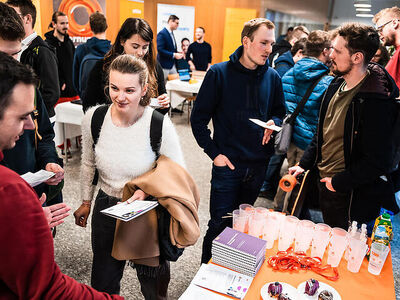
MU implements a variety of measures to promote gender equality as part of the University's strategic commitment to the principles of transparency, equality and accountability, while balancing the work and personal lives of all its employees and students. MU fulfils this commitment at the level of individual faculties and institutes and through the activities of the University as a whole.
The framework for the development and implementation of effective measures to achieve the goals in the priority areas of gender equality at MU and within MU units is contained in the
MU Gender Equality Plan 2022-2024. The measures of the MU Gender Equality Plan 2022-2024 are proposed on the basis of the results and recommendations of gender audits conducted by MU units in the period 03-07/2021 (the summary report of the gender audit at FI is available
here). These findings were supported by content analysis of documents, analysis of statistical data, results from questionnaire surveys, group discussions with selected groups of people, individual and group interviews.
The priority areas of the MU Gender Equality Plan 2022-2024 are:
- Transforming the internal culture of the organisation
- Gender balance in leadership and decision-making
- Combining work and parenthood
- Recruitment, selection and promotion
- Measures against sexual harassment and other forms of gender-based violence
- Integrating the gender dimension into the content of research and innovation
- Collection and monitoring of gender-differentiated data
- Allocation of human and financial resources to address gender equality issues
FI webinar on the growing role of diversity in IT
 Speaker. Ing. RNDr. Barbora Bühnová, Ph.D.
Speaker. Ing. RNDr. Barbora Bühnová, Ph.D.
D., Ph.D., Vice Dean for Industry Relations, FI MU
Vice-Chair of EUGAIN Network, co-founder and member of the Board of Directors of Czechitas
Introduction to the webinar: In a world that is increasingly driven by technology, digital innovation and creativity can hardly be fully exploited if only a small part of the population creates it. In this context, the question often arises - why do girls choose particular interests, study programmes and careers as an alternative to computer science or information technology? What are the motivators and benefits of these alternatives that IT lacks? Our webinar focuses on the growing role of diversity in IT, including some findings from recent studies on the topic. We'll discuss effective strategies for making IT more inclusive and open to diverse talent. And we'll share lessons learned from engaging more girls in IT, including insights and strategies specifically related to academia.
Webinar recording
The webinar also includes this
presentation.
Key takeaways:
- The importance of diversity is growing in terms of
- Talents and cognitive styles
- Connecting disciplines
- We cannot afford to lose talented people
- Pressure on the technology workforce shortage will continue to grow
- Women are a great reservoir of talent for tech in the Czech Republic
- We often miss talented people because we lack their talents
- Barriers and factors mentioned in the webinar
- Critical mass and sense of belonging
- Stereotypes and false beliefs about the underrepresentation of women in computing
- Differences in self-esteem and perfectionism
- Faulty meritocracy and valuing of different talents
- Differences in talent/cognitive styles correlated with gender
- Unconscious biases and their relation to decision making
- Challenges in achieving diversity
Resources:
News, invitations, courses
Gender Summit Virtual Conference (GS24)
The Gender Summit Virtual Conference (GS24) will take place on
22 and 23 May 2024. The Gender Summit was created in 2011 as a result of the EU-funded
genSET project to create a platform dedicated to gender issues in the environment of scientific institutions.
This year's event will feature approximately 70 international experts who will present the latest research findings and analytical approaches to gender issues that will help the scientific community reflect on the negative impacts of social inequality on the quality of research. In addition, the event will offer a space to discuss measures that help integrate gender policy into scientific practice. The virtual conference will be followed by an in-person meeting on 19 November 2024 in Ottawa, Canada.
A detailed agenda for the virtual conference is available
HERE. Participation is free to register
HERE.
Gender Sensitive Communication Workshop
On
April 10, 2024, staff from the Human Resources Department, the Office of Studies, the Office of Doctoral and International Studies, and the Office of External Relations and Partnerships participated in an online workshop on "Gender Sensitive Communication". The workshop was led by NKC gender and science lecturers.
The workshop was primarily aimed at imparting tips on how to incorporate gender-sensitive communication into regular internal communication, faculty regulations and documents, communication towards students and on social media.
NKC Gender and Science's handbook entitled
"How to Gender Sensitive Communication in an Institution" can be downloaded
HERE.

Courses Monitoring and Evaluation of the Gender Equality Plan, Gender Equality in the Institution and Gender Equality Plans I and II
Want to learn more about gender equality? The National Contact Centre - Gender and Science of the Institute of Sociology of the CAS offers courses on gender equality, which are designed as e-learning, publicly available training for interested women and men from universities and research organisations in the Czech Republic. These courses are designed to provide a comprehensive understanding of gender equality plans and aim to provide an overall overview of the topic of gender equality.
You can register for the courses
HERE.
From April 2024, it is possible to enrol in the new mini-course
Monitoring and Evaluation of the Gender Equality Plan. The course focuses on monitoring and evaluation of gender equality plans. It introduces in detail the objectives of monitoring and evaluation, the basic concepts that the field of monitoring and evaluation works with, as well as the manual "How to monitor and evaluate gender equality plans" and specific tools for monitoring and evaluation.
The course "Effective Communication in International / Intercultural Teams
A short course on "Effective Communication within International / Intercultural Teams" will take place from
24 November 2023 to 26 November 2023.
Do you want to learn tips on how to work effectively in an international team, how to manage time management or remote communication? Sign up for a free three-day course organised by the MU Language Learning Centre.
The course is available for MU employees and PhD students who are also employees. Try out exercises and scenarios from practice together with foreign lecturers. The course must be registered for via the CJV website and is conducted in English. Preliminary program and link from the registration can be found
HERE.
Webinar on the gender dimension in research
Invitation: On 4
October 2023, the NCC will host a webinar on the gender dimension in research. The online workshop by Professor Stefanie Lemke from BOKU Vienna, entitled Integrating gender in food systems research - concepts, approaches and experiences from the field, is part of the NKC's educational activities on gender and science focusing on the gender dimension in science. The workshop is intended for the professional public and will be held in English.
More information and registration for the webinar can be found
HERE.
European Diversity Month
Promoting diversity and creating inclusive workplaces is a long-term challenge. The European Diversity Month is in May and a number of activities take place during the month, such as the International Conference - European Diversity Day 2023: Building Bridges - Diversity, Sustainability and Partnership or the European Commission's Launch Conference with the participation of European Commissioner Helena Dalli - 28 April 2023.
For inspiration, ideas and themes for the European Diversity Month celebrations, you may find the concise and clear
Guide, which can be downloaded below in English and English
HERE.
Minerva Informatics Equality Reward - Best Practices in Supporting Women
The Minerva Informatics Equality Award recognises outstanding European initiatives and best practices supporting women's careers in informatics research and education. The aim is to recognise successful initiatives with a measurable impact on women's careers at all stages. These initiatives can serve as examples of best practice and be adopted by other institutions. Until 2022, the award was given in a 3-year cycle, focusing on a different career stage each year. Projects from previous years can be found
HERE.
Starting in 2023, the focus is on any stage of career advancement for women in computer science research and education. Best practices are compiled in this
Informatics Europe BROCHURE.
Sexual harassment
One of the priority areas of the MU Gender Equality Plan 2022-2024 is measures against sexual harassment and other forms of gender-based violence. Detailed information on sexual harassment can be found
here. The handling of sexual harassment cases on MU campus is governed by the university's methodology.
Methodology for handling sexual harassment cases at Masaryk University
MU has established a
network of contact persons who provide counselling to victims, witnesses and accused of sexual harassment, who are professionally trained in the issue and who take an active interest in the topic. In terms of communication with the person involved in such a case, all contact persons have received tailor-made workshops from
Konsent and are also familiar with the process of dealing with such a case within MU. The contact person will listen to you, introduce you to the assistance tools available within and outside MU, depending on your specific situation, and explain the MU resolution process to you. All of this could help you make an informed decision about how to handle your situation. If you wish to refer your case to MU, the contact person is ready to help you with this.
There are
contact persons under the
MU Counselling Centre, contact persons from
individual faculties and a contact person from the
Student Chamber of the Academic Senate. It is possible to choose the contact person you wish to contact, whether you are a student, staff member or employee. In addition to choosing whether to contact a female or male, you can also choose to use a contact from your faculty or a contact person outside of your faculty.
FI contacts
doc. Ing. RNDr. Barbora Bühnová, Ph.D.
FI Vice Dean for Industry Partners
| Phone: |
549 49 4494 |
| E-mail: |
buhnova6-5YJgvd3@fifBBqgzD3n.muni80_tJLld8.cz
|
doc. RNDr. David Svoboda, Ph.D.
Vice Dean for Undergraduate Studies
| Phone: |
549 49 4383 |
| E-mail: |
svobodasOG4kw0Rz@fi5t2oYieFw.muniphEeQhUys.cz
|


 Speaker. Ing. RNDr. Barbora Bühnová, Ph.D.
Speaker. Ing. RNDr. Barbora Bühnová, Ph.D.


